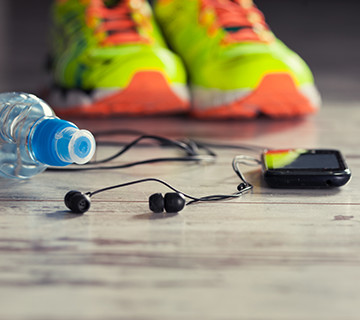No More Exercise Excuses

You’ve heard it before: Exercise is a great way to increase flexibility, reduce pain, ease joint stiffness—not to mention lose weight and increase strength. But most adults aren’t getting the recommended 150 minutes of moderate-intensity activity a week, according to a recent study by the journal Arthritis & Rheumatism.
Why? There are plenty of excuses not to exercise, so we’ve consulted with the experts to help you overcome the most common ones. Then you can be on your way to working out in no time. As always, talk to your doctor before starting any new workout routine.
Excuse #1: I don’t have time.
We get it: There’s barely enough time for work and family responsibilities much less a trip to the gym. But you don’t need hours of time each day to exercise. Even 75 minutes of working out a week can help relieve achy joints. Consider a few extra laps around the mall while you shop, or go for a quick walk during your lunch break. Just a few minutes of exercise will add up over time.
Excuse #2: I’m in too much pain.
When you’re in pain, it can be hard to find the motivation to workout. But even mild activity can help ease aches and pains. Choose a low-impact activity, like biking, swimming or simply walking in a pool. Start with some stretches to help loosen up your muscles.
Excuse #3: It’s boring.
You’re more likely to stick with an exercise if you enjoy it. You can ask a friend, spouse or coworker to join you to make it even more fun. An exercise buddy can also help keep you accountable so you’re less likely to skip a workout, and you can motivate each other to reach your goals.
Excuse #4: I’m too tired.
Exercise can actually give you more energy. That’s because physical activity increases circulation throughout the body, and triggers the release of endorphins which can help you feel more alert and invigorated. And it’s also wise to listen to your body: If you’re tired at the end of the day, try working out in the morning or at lunchtime.
Excuse #5: I’m not trying to lose weight.
There’s more to working out than simply losing weight. It can help fend off diseases such as cancer, diabetes, dementia and osteoporosis as well as help improve your day-to-day life. Exercise can make you happier, less stressed and more productive at work. It can also help improve range of motion, so it’ll be easier to climb stairs, get dressed and take out the trash.
Excuse #6: I’m too embarrassed.
Feeling self-conscious about exercise is common, but you shouldn’t feel out of place at your gym. If you do, consider switching to another one with an environment and staff that help you feel comfortable. Many gyms have classes and options suited to a variety of interests and fitness levels. If a traditional gym still isn’t your thing, check out the local community center or start walking, biking or swimming on your own.
Excuse #7: It’s too expensive.
Based on research from the International Health, Racquet & Sportsclub Association, fees are the main reason people don’t sign up for gyms. But the experts all agree that an expensive gym isn’t the only place to get a good workout. You can create an inexpensive home gym with just a pair of dumbbells and resistance band. There are also many online options for workout advice and exercise routines plus affordable fitness DVDs you can watch at home.
Excuse #8: I don’t see any results.
You’ll probably see payoffs like weight loss and fewer aches and pains after you start working out, but it’s natural to plateau at some point. That’s because your muscles eventually get used to the activity. To help shake things up, add new workouts to your regular routine. This can be as simple as alternating between a few minutes of brisk walking with your normal stride. You might also need to kick-start your mind: reminding yourself how beneficial exercise can be for your daily life (not just long-term) can help you stay motivated longer.
Excuse #9: I don’t even know where to begin.
If it’s been a long time since you exercised, consider working with a personal trainer. Not only can they suggest exercises and routines but they can also help you learn the proper form and techniques to prevent injury and get the best results. The key is finding a qualified expert who’s used to working with people like you.
Excuse #10: I’ll do it tomorrow.
Even the best intentions to work out can get derailed, so we often say we’ll “start tomorrow.” But procrastinating can be become a never-ending cycle. To snap out of it, make a plan. Schedule workouts on your calendar and have exercise dates with friends. Setting small goals is best, and don’t forget to reward yourself when you meet them—this can provide extra motivation for you to reach the bigger goals later on.
Source:
https://www.arthritis.org/living-with-arthritis/exercise/success/exercise-excuses.php


